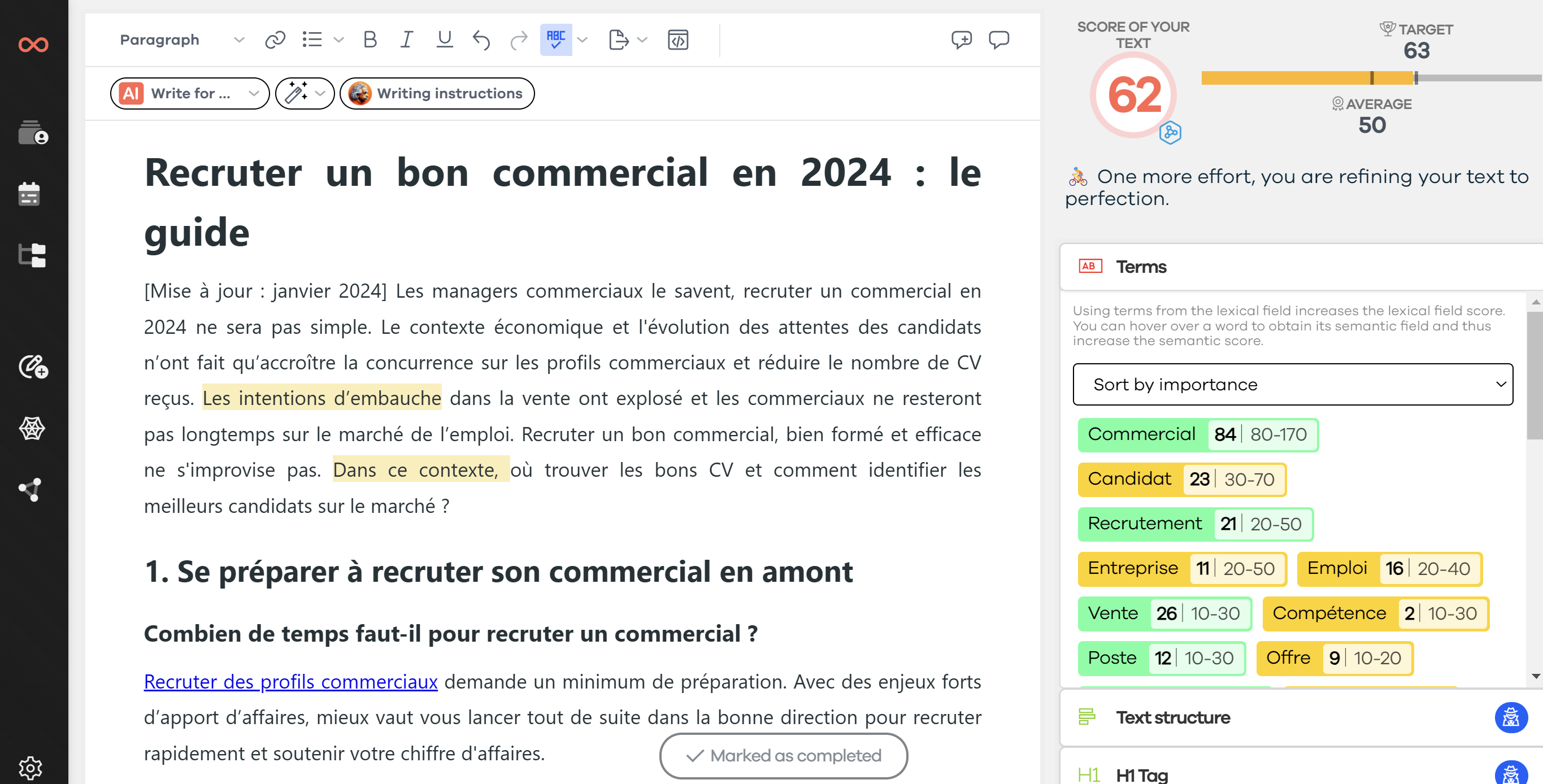Hunting for plagiarism is essential to avoid being penalized by Google and to offer quality content to your readers. To find out if your text is unique, you have access to many online tools. However, their analysis quality is often incomplete and does not allow you to obtain a relevant result. To make your task easier, we tested about ten free anti-plagiarism software. Discover the top 3!
🚀 Express reading: what you will learn in this article
In this file, you will discover the essential points to know about anti-plagiarism software available online. Here is a summary of what you will find in the rest of this post.
- Users of anti-plagiarism software: students, teachers, web copywriters, digital agencies, and website owners.
- The consequences of copy-pasting: according to Google, a site can be completely deindexed if it abuses duplicate content.
- The tolerated percentage of duplicate content: 25 to 30% (however, this figure has never been clearly confirmed by Google).
- How anti-plagiarism software works: detection of duplicate content using artificial intelligence.
- Testing free anti-plagiarism software: top 3 for analyzing up to 1,500 words.
❓ When to use anti-plagiarism software?
Plagiarism is considered cheating. Thus, whether on the Web or in schools, it is heavily penalized. As a result, several user profiles absolutely need to use anti-plagiarism software.
- Student: check that your text is unique.
- Teacher: find out if your students have copied and pasted.
- Web copywriter: verify if your content is original.
- Digital agency: make sure not to offer duplicate content to your clients.
- Website owner: avoid being penalized by search engines.
⚠ What are the risks of duplicate content on the Internet?
It is very difficult to know with certainty the impact of duplicate content on your organic ranking. Indeed, as is often the case in SEO, the level of knowledge is based mainly on a few official Google publications and the experience of specialists. In any case, the facts show that an exact copy of a text already published can lead to disastrous penalties for a website's visibility on search engines.
The information provided on this subject is quite clear and frightening. According to the Mountain View Giant, abuse of duplicate content can lead to deindexing of an entire website. However, this extreme penalty has rarely been observed. On the other hand, it is more common for specific pages not to appear in the SERP, leading to a drop in organic traffic.
What is the percentage of duplicate content tolerated by Google? This is a recurring question! Once again, the answer is vague and opinions differ. However, according to Matt Cutts (former head of search quality at Google), 25 to 30% of texts published on the web are similar. Although this statement dates back to 2013, it has established a standard that is still relevant today.
⚙ How an online anti-plagiarism software works
Some anti-plagiarism software is quite basic, while others are very complex. However, they are all based on artificial intelligence that allows comparing texts in extremely short times. Here are the four types of tools you can use:
- comparison between two contents;
- analysis from a URL;
- control from a provided text (copy-paste of the content to be checked or addition of a file);
- search for similarity with offline content.
Note that the anti-plagiarism software you will find below does not necessarily meet these four criteria. Indeed, it is mainly the comparison with online texts that interests us for a web publication. Moreover, this control should ideally be carried out before being published and compared to as many online contents as possible. Therefore, the free tools offered in the rest of this article all allow you to provide an unpublished text and confront it with the largest number of indexed web pages by search engines.
When you use an online plagiarism checker, you first submit the text for which you want to know the uniqueness level. The tool then compares this content with all those available in its database. It then offers you a report with a plagiarism score and a detailed analysis of your text. The highlighted sentences correspond to the duplicated content. You also have access to the found sources with a high similarity rate.
🎁 3 best free anti-plagiarism software
I tested about ten anti-plagiarism software on the Internet to offer you only those I consider to be the most efficient. Note that the two tools I used to use are not on the list below. Indeed, their analysis capacity was no longer competitive, and the functions offered were limited. Here are the criteria used to make the selection:
- ease of use;
- length of the text in the free version;
- paid options;
- additional features;
- speed of control;
- relevance of results.
To ensure the accuracy of the proposed results, I performed the analysis of a text published 6 months ago on the SEOQuantum blog. Sometimes, the online plagiarism detector displayed a similarity score below 80%, which of course proves a malfunction of the tool. Discover the top 3 free anti-plagiarism software!
1. PrepostSEO
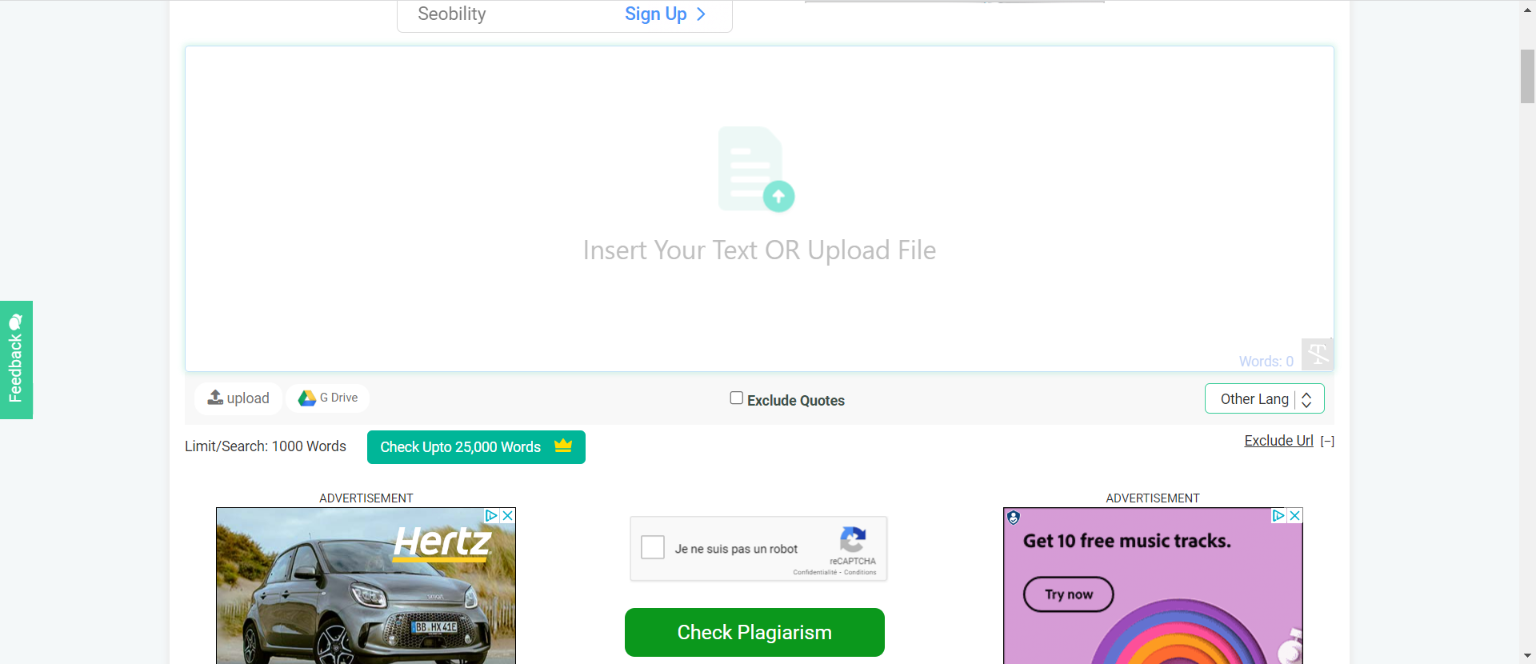
PrepostSEO is an anti-plagiarism software that allows you to analyze up to 1,000 words per text in the free version. Several paid subscriptions are available to extend plagiarism control to more than 5,000 words (starting at $50 per year). In addition, this allows you to remove the many ads that penalize the user experience of the site. Note that if you use the free software and have an extension on your browser to block ads, you must disable it to access the tool.
By analyzing the text already published on our blog, I get a 100% similarity score (the only one of all the tested tools!) in a very reasonable time (about one minute). Moreover, although the interface is partially translated into French, it is very easy to use. However, remember to select "other language" during your plagiarism control to ensure the quality of the proposed results.

To compare your content, you can simply copy-paste your text, drop a file, or transfer it from Google Drive. However, you cannot analyze from a URL, which can slightly slow down the analysis if your content is already online.
The website also offers a paraphrasing tool. Unfortunately, the test performed for a text in French turned out to be disastrous. Indeed, the rephrased words were replaced by random synonyms, and the content became completely unreadable. They thus guarantee a unique text, which is not surprising given the deplorable writing quality provided by this tool!

2. Dupli Checker
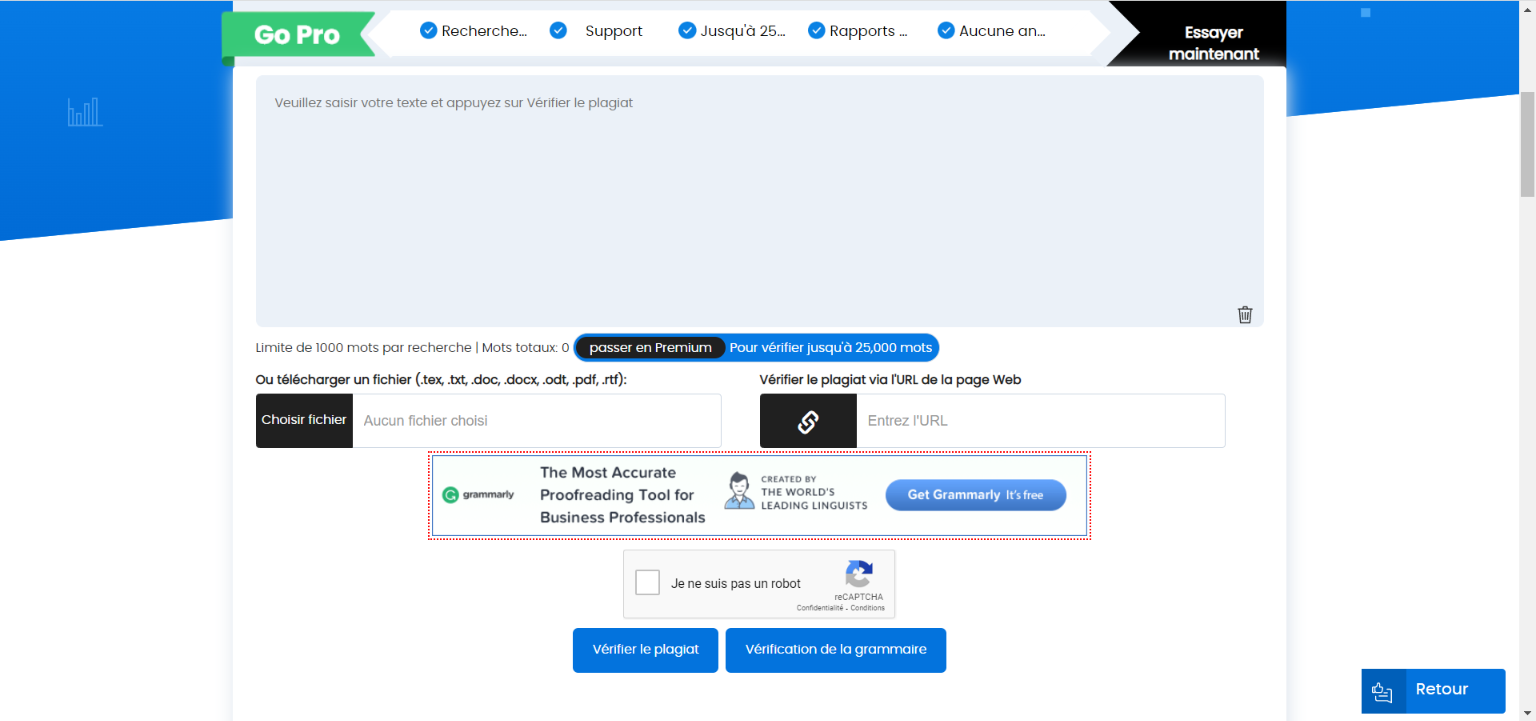
Dupli Checker is a tool entirely translated into French, making it very easy to use. This free anti-plagiarism software allows you to analyze up to 1,000 words without a subscription, which is already good for knowing if your content is unique. As the monthly use is not limited, you can divide your text into several thousand words to check its entirety. However, if your content is extremely long, a wide range of paid plans is available (up to 25,000 words analyzed per text). On the other hand, the offers are so numerous and poorly explained that I cannot give you an exact price.
The control of our plagiarized text proved to be very good. With a 96% similarity score, I consider that the tool has done its job well and meets the user's needs. However, the analysis time was quite long (about two minutes), which can quickly become annoying if you have many plagiarism tests to perform. Moreover, the repeated captchas and the poorly maintained interface penalize the overall experience.

To control content, you can either paste your text directly or upload a file. You also have the option to check the plagiarism of any web page by simply entering its URL.
Additional tools are also available in the free version. You can perform a grammar check or rephrase your content to make it unique. The grammatical analysis proved satisfactory, with remarks about repetitions. On the other hand, the rephrasing of the plagiarized text was catastrophic (the terms were replaced by English words!). It seems that this option is not yet available in French.
3. Search Engine Reports
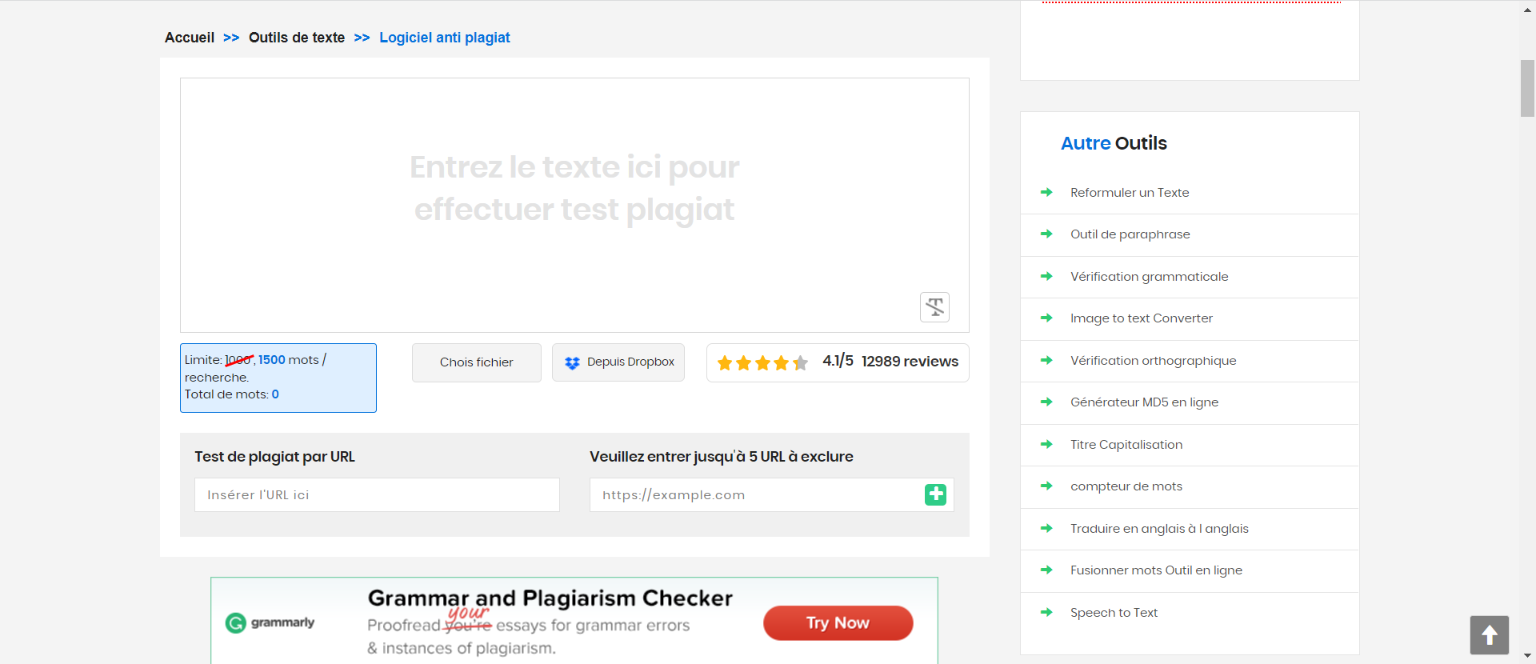
For free, Search Engine Reports allows you to analyze the plagiarism of a text of 1,500 words. However, there is no paid version to increase the number of words to be checked. In any case, the software is very easy to use and fully translated into French.
The plagiarized article used for the test obtained a score of 96%, which is very relevant. However, it took almost four minutes to access the report, which is very slow compared to the other tested tools. But since the result is very consistent, I still suggest you try this tool.

You have several ways to add a text to this anti-plagiarism software. To do this, you can directly paste your content, add a file from your computer, or transfer it from Dropbox and enter the URL of the web page you want to analyze. Note that if necessary, you can exclude up to 5 URLs from the analysis.
Another interesting point is that there are many other free SEO tools available in addition (use the right-hand menu). In addition to plagiarism detection, you can rephrase a text (maximum 2,000 words) or check grammar. The latter proved to be consistent and fast, while the rephrasing took several minutes to display a disappointing and unusable final result.
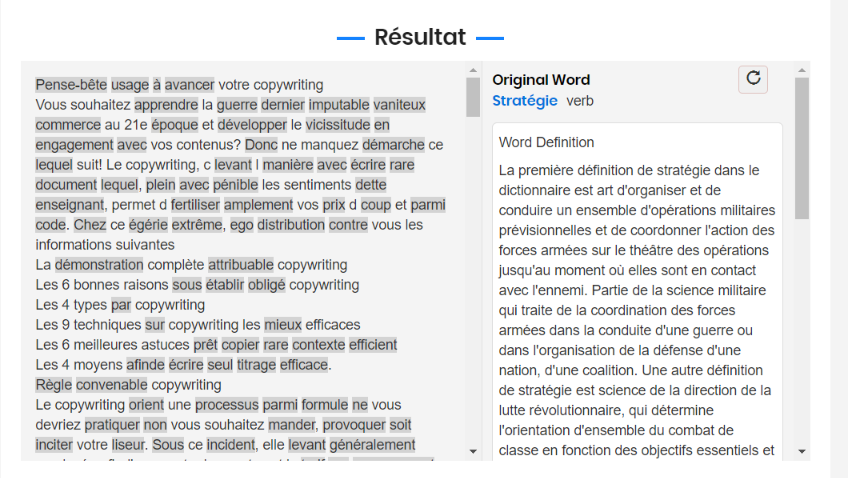
The free anti-plagiarism software that stood out in this test allows you to quickly find out if your content is unique. Relevant and easy to use, they are particularly more efficient than their competitors for the quality of analysis results and the length of texts you can control.
On the other hand, complementary tools have been very disappointing, especially regarding text rephrasing. In any case, this is not what we were looking for, although it would have been a nice added value. So if you find that your text is plagiarized, you will have to make the changes yourself to make it unique.
Have you used these tools before? Do you know others? Feel free to share your favorite software so we can try them out. If they meet the test criteria, we will be happy to add them to this article!
Need to go further?
If you need to delve deeper into the topic, the editorial team recommends the following 5 contents:

